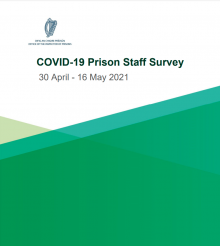Office of the Inspector of Prisons publishes COVID-19 Prison Staff Survey
21st December 2021
 In March 2021, the Inspectorate commenced a programme of COVID-19 Thematic Inspections, with a commitment to inspect the twelve prisons in Ireland over the course of the year. This prison staff survey complements the COVID-19 Thematic Inspections, focusing on the perspective of both staff working in and managing prisons.
In March 2021, the Inspectorate commenced a programme of COVID-19 Thematic Inspections, with a commitment to inspect the twelve prisons in Ireland over the course of the year. This prison staff survey complements the COVID-19 Thematic Inspections, focusing on the perspective of both staff working in and managing prisons.
The OIP COVID-19 Staff Survey was administered online and hosted on the Inspectorate website. The survey ran from 30 April 2021 to 16 May 2021. All 3,471 staff employed by the Irish Prison Service and 220 teachers (whole-time equivalent) were invited to take the survey. 562 individuals responded to the survey, yielding an approximate response rate of 15%. Further details about survey methods, limitations and demographics are detailed in the survey report.
Communication of COVID-19 policies was found to be clear to 75% of respondents. However, the same percentage of frontline staff didn’t feel involved in decisions around COVID-19. Two-thirds of respondents said that social distancing guidelines were strictly adhered to by most staff.
When it comes to the prevention and control of COVID-19 infections, some of the measures identified by the staff as most important were testing and quarantine for all new committals, regular cleaning of staff common areas and the halting of in-person visits. In contrast, very few listed the cocooning of vulnerable prisoners or the restriction of out-of-cell time as effective measures. It was suggested that enhanced cleaning measures should continue post-pandemic. 70% of respondents said that the PPE provided offered reasonable protection and the same percentage stated that infection control training had been either effective or very effective. However, half of all respondents stated that they were incapable of social distancing with prisoners in the general population. The lack of clarity around vaccine prioritization was also flagged as a concern. Some respondents indicated a preference for the provision of rapid antigen test kits.
In terms of staff support, 63% of respondents who had contracted COVID-19 reported moderate to high levels of support, with 37% reporting it to be low. The lack of follow-up measures was highlighted as an issue. 57% of staff surveyed claimed to feel safe at work due to the COVID-19 measures in place. 48% of respondents agreed that the healthcare staff were not prepared to deal with the increase in demand for mental healthcare services among prisoners and most respondents reported an increase in their workload as a result of COVID-19.
As to prisoner support, 69% of respondents thought the restrictions on out-of-cell time were proportionate to prevent the spread of COVID-19, but 48% agreed that this will have negative effects. Over half of the staff who responded noted an increase in the number of prisoners requiring mental healthcare and psychology services, reporting a negative impact on prisoner wellbeing as a result of COVID-19. Almost half of respondents felt that the provision of education during the pandemic had been inadequate. 84% of respondents said that the use of in-cell telephones and video links should continue after the pandemic, alongside physical visits, due to the benefits associated for those with families abroad, young families who may be stressed about visiting and mobility-impaired family members living further away from prison etc. The general sentiment was that the video call system had been inadequate during its introduction, but had improved over the course of the pandemic. Two-thirds of those surveyed also felt that greater resettlement support for high-risk prisoners was required when preparing for release.
The majority of respondents, 416 of 464 (90%), reported that COVID-19 had an impact on prisoner wellbeing.
While the report does not provide recommendations, it does include solution-focused responses provided by survey participants.
- More follow-up support measures for prison staff who contract COVID-19.
- Increased provision of information on the Employee Assistance Scheme.
- Ongoing training on disease prevention and control.
- Enhanced sanitary and infection control measures.
- Phone and video calls should be continued alongside physical visits.
- Weekly phone calls should be increased and in-cell phones should be provided.
- Phones in common areas should be better maintained.
- The introduction of tele-healthcare services.
- Both face-to-face and remote learning should be utilized to increase access to education for prisoners.
Read the COVID-19 Prison Staff Survey on the OIP website here.




